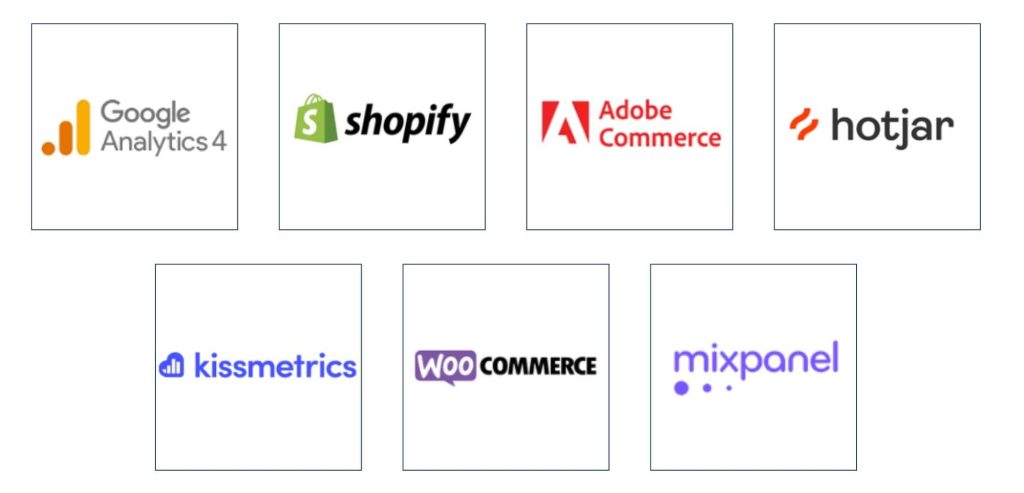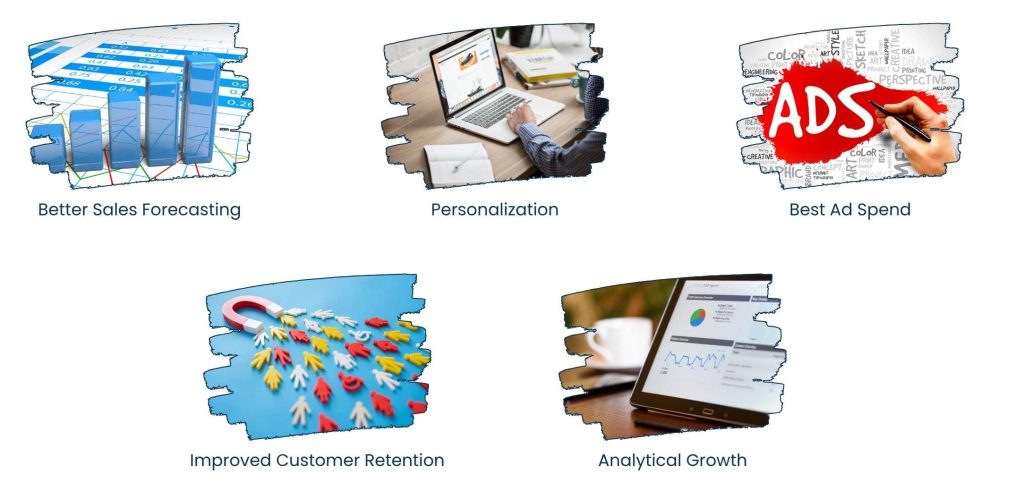Introduction
Running an online store is more than listing products; you need to understand customer behavior and analyze marketing performance. This is where eCommerce analytics tools come in.
These portals convert raw data into useful intelligence, allowing companies to optimize everything from advertising sources to conversion funnels. Whether you are keeping an eye on customer retention or the performance of ad campaigns, eCommerce analytics tools bring you the “why” behind every buy.
At Tasks Expert, we work with an expert team of virtual analysts who assist companies in implementing and managing analytics platforms that return actionable insights to help our customers get the strategic intelligence they need to make better decisions and get a high payoff.
What Are eCommerce Analytics Tools?
eCommerce analytics tools are online software programs that monitor, measure, and analyze data about a digital store’s functioning. They tell you how customers engage with your site, what drives sales, and where improvements are necessary.

Some important jobs of ecommerce analytics tools are:
- Tracking website traffic and user behavior.
- Monitoring sales performance and revenue.
- Analyzing customer demographics.
- Measuring campaign ROI.
- Identifying top-performing products and categories
In essence, they’re your digital dashboard that tells you what’s working for your business, and what’s not. See how our eCommerce Virtual Assistant Services help manage these analytics.
Also Read: AI Ethics Consulting
Why You Need eCommerce Analytics in Your Online Business?
The currency of E-commerce is data. If your business doesn’t have those valuable insights, you might as well just have the most aesthetically pleasing store there is, because you won’t be able to make customers out of visitors without them.

This is why you need e-commerce analytics for any business:
1. Better Marketing ROI
Analytics tools reveal what campaigns, ads, and keywords are driving sales — so you can focus on what works. Learn more about Marketing Support Virtual Assistants who can help interpret these insights.
2. Smart Inventory Management
Identify products that are top sellers or non-performers so you can manage inventory effectively.
3. Enhanced Customer Experience
You can even customize product suggestions and special offers by knowing how they browse and buy.
4. Reduced Cart Abandonment
Monitor where people abandon the checkout process and fix these issues.
5. Competitive Advantage
Regular analytics review helps you adjust to market trends faster than the competition.
Companies using analytics grow faster — not by guessing, but with confidence.
Top eCommerce Analytics Tools in 2025
There are a million different analytics tools out there; you should only bother with those that fit your store goals and platform.

Here are some of the best eCommerce analytics tools to consider:
1. Google Analytics 4
The one and only traffic analysis tool which reads who your customers are!
Features:
- Conversion tracking and event analysis.
- Multi-channel attribution.
- Real-time traffic insights.
Best for: Small to medium-sized businesses that want a powerful tool — for free.
2. Shopify Analytics
It comes with its own analytics dashboard that tells users about store sales and marketing performance, as well as customer trends.
Features:
- Real-time sales tracking.
- Customer segmentation.
- Product and discount performance.
Best for: Shopify retailers seeking platform-specific insights. Read how our Shopify Virtual Assistant Services optimize these dashboards.
3. Adobe Commerce Business Intelligence
An enterprise-grade store analytics suite.
Features:
- Customizable dashboards.
- Multi-channel data integration.
- Predictive insights for growth.
Best for: Large companies with complicated operations.
4. Hotjar
A behavior analytics tool that shows you how visitors use your website.
Features:
- Visual heatmaps.
- Session replays.
- Feedback surveys.
Ideal for: Boosting website UX and conversion rates. Learn how UX Virtual Assistants can support these insights.
5. Kissmetrics
Customer journey management and retention solution.
Features:
- Funnel reports.
- Cohort analysis.
- Customer lifetime value insights.
Best for: Businesses with subscription or recurring revenue.
6. WooCommerce Google Analytics Integration
Integrates WooCommerce store data with GA4 for a holistic performance view.
Features:
- Sales funnel tracking.
- Product performance reports.
- Traffic and conversion analysis.
Best for: WooCommerce users scaling up with analytics.
7. Mixpanel
A tool for product analytics and user analytics for determining patterns and engagement metrics.
Features:
- Real-time Monitoring.
- Retention and cohort tracking.
- Funnel optimization.
Best for: SaaS, digital product sellers.
Also Read: Event Planning Virtual Assistant
Advantages of Using an eCommerce Analytics Tool
Why does incorporating analytics into your eCommerce domain prove beneficial for all departments?

Here’s how your business gains:
- Better Sales Forecasting: Forecast demand and prepare seasonal campaigns.
- Personalization: Market to your customers with offers and products that matter.
- Best Ad Spend: Get rid of the ads that aren’t working.
- Improved Customer Retention: Know why customers buy again.
- Analytical Growth: Go to market based on actual data.
Example:
A fashion retail store online, using Shopify Analytics and Hotjar, increased its conversion rate by 22% after analyzing heatmaps to place products.
At Tasks Expert, we assist eCommerce businesses with analytics dashboard management and compiling weekly insight reports, enabling the business owners to work on strategy, not spreadsheets. Discover how our eCommerce consulting services provide strategies to boost sales, analytics, and performance tracking, and grow your online store.
What Virtual Assistants Can Do to Help Manage Your eCommerce Analytics?
Analytics are great — but keeping track of them every day can get overwhelming. This is where a Virtual assistant (VA) comes into play.

Here’s what a VA for ecommerce analytics can:
- Establish and monitor dashboards.
- Measure KPIs such as conversion rate and ROAS.
- Generate and share performance reports regularly.
- Identify sales trends and anomalies.
- Work with the marketing and inventory groups.
Rather than doing all this work themselves, Fleet and his fellow business owners have transferred data analytics management into the hands of talented VAs from Tasks Expert, critical to ensuring that their reporting information is precise, current, and useful, without ever needing to log in.
Visit our virtual assistant services to see how we support eCommerce businesses.
Choose the Most Powerful eCommerce Analytics Tool
The ideal analytics tool for your store depends on the size of your store, platform and your requirements.

- Establish Goals: Do you want to drive sales, retention or marketing ROI?
- Integration testing: Verify the application functions on your platform.
- Features Overview: Find custom dashboards and automation you can use.
- Scalability: Pick a tool that can scale with your business.
- Ease of use: The more natural it is to manipulate, the quicker you’ll be able to train with and set up your hammock.
Add in the right analytics package and some virtual expert support, and you’ve got continual growth and performance tracking. Read more on Analytics-Focused Virtual Assistants here.
Conclusion
We can’t just rely on ‘natural feel’ anymore to be a successful eCommerce seller. The top eCommerce analytics empower businesses to connect with their audience, optimize marketing tactics, and make the most of sales opportunities.
Everybody’s doing this: From a store hosted on Shopify to a worldwide marketplace operator, you need data behind every decision.
We at Tasks Expert offer virtual ecommerce support that helps you run your business analytics tools to ideate, build, and execute campaigns for real ROI.
Learn how we can streamline and scale your online business offering either our services, able to explore industries we serve.
Frequently Asked Questions
They oversee the kind of information kept by online retailers — sales, customer behavior and performance of marketing — which can be used to make smarter business decisions.
Some of the most popular tools are: Google Analytics, Shopify analytics, Hotjar etc.
Indeed, when they’re used properly, analytics tools can assist very small online retailers like Sally Findlay’s with spotting opportunities for growth and avoiding the waste of advertising spend, as we shall see.
Compare important reports – I’d recommend once a week to twice a month so you can stay apprised of how things are trending and doing performance-wise.
Yes – our VAs can assist businesses in configuring, tracking, and reporting insights via leading eCommerce analytics tools.
About Us
Tasks Expert offers top-tier virtual assistant services from highly skilled professionals based in India. Our VAs handle a wide range of tasks, from part time personal assistant to specialized services like remote it support services, professional bookkeeping service etc. Furthermore, it helps businesses worldwide streamline operations and boost productivity.
Ready to elevate your business? Book a Call and let Tasks Expert take care of the rest.









